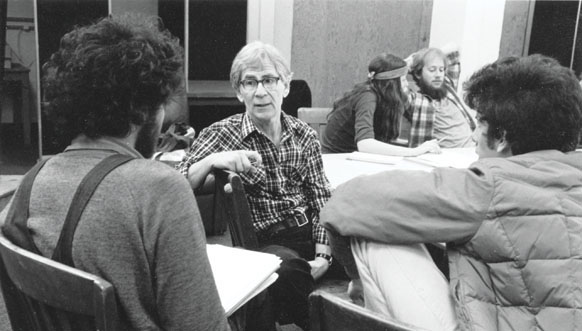
IRIS login | Reed College home Volume 90, No. 2: June 2011
To Squier the Circle

Les Squier [psychology 1953–88] also served as dean of students and interpreter of dreams.
Psych Students Deepen Understanding and Community at Squier Retreat
By Allen Neuringer
High on a bluff overlooking the Columbia River, 32 Reed students, sophomores to seniors, gather with 8 psychology professors on a Saturday morning for the 13th annual Squier Retreat at Menucha, a retreat center in the Columbia Gorge. Through Sunday afternoon, students and faculty will explore serious ideas and have fun.
After introductions in the meeting room in Ballard Hall, we walk to the dining room, where the faculty serve lunch family style. Meals at Menucha are satisfying, if not fancy, with provisions for vegetarians and vegans. Students and faculty often sit with different folks at different meals, so that discussions are varied and the room is abuzz with chatter and laughter.
英航
“Faculty Speed Dating,” organized by Professor Kris Anderson, gives students time to question each faculty member individually. Students can ask any question on any topic with the understanding that the faculty member will answer honestly or choose not to answer. Sample questions: What led you to become a psychologist? Do you believe in God? What was your most embarrassing experience? What experiment would you do if you had no ethical constraints? Why were you arrested (asked of only one colleague!)? How do you organize your time?
The sun shines as we walk to the grassy field below Ballard. Some of us play tag—three faculty members run almost as fast as students; some form a group tangle and unwind (in a game called Knots that I won’t try to explain); some kick a soccer ball across the field; others converse or stroll. A bald eagle soars overhead as we end the afternoon with a walk to view dusk over the Columbia River.
After dinner comes entertainment. In Psychology Pictionary, organized this year by Jessica Gerhardt ’11, and Professor Kathy Oleson, students try to depict, via drawings, randomly selected psychological words or phrases, such as primacy effect, proprioception, oral fixation, and retrograde amnesia. Both drawings and called-out guesses can be hilarious.
一个
A word about Les Squier. At the beginning of the retreat, I talk about Les and why the event was named in his honor. More than that: the retreat was motivated by Les’s life. He taught at Reed for 43 years, was chair for 20, and set the tone, goals, and ethics of the psychology department over much of that time. Les sought excellence in teaching, critical thinking, mutual support and friendship among faculty and students, and a focus on student welfare, all of which psychology faculty value to this day. After Les died in 1996, the Squier Memorial Fund was established with the great help of Anne Wood Squier ’60, and the department draws on it to subsidize the retreat.
At the end of each Squier retreat, my colleagues and I are tired (as, no doubt, are the students). We’ve been away from homes and families and have lectures to prepare, quals to read, labs to organize. But I know that my colleagues join me in that, after each retreat, I feel a closeness to our students, an appreciation of their hidden talents, an admiration for my colleagues—their energy and their creative ideas—and a deep satisfaction that we continue a tradition modeled on Les Squier’s life at Reed.


LATEST COMMENTS
steve-jobs-1976 I knew Steve Jobs when he was on the second floor of Quincy. (Fall...
Utnapishtim - 2 weeks ago
Prof. Mason Drukman [political science 1964–70] This is gold, pure gold. God bless, Prof. Drukman.
puredog - 1 month ago
virginia-davis-1965 Such a good friend & compatriot in the day of Satyricon...
czarchasm - 4 months ago
John Peara Baba 1990 John died of a broken heart from losing his mom and then his...
kodachrome - 7 months ago
Carol Sawyer 1962 Who wrote this obit? I'm writing something about Carol Sawyer...
MsLaurie Pepper - 8 months ago
William W. Wissman MAT 1969 ...and THREE sisters. Sabra, the oldest, Mary, the middle, and...
riclf - 10 months ago